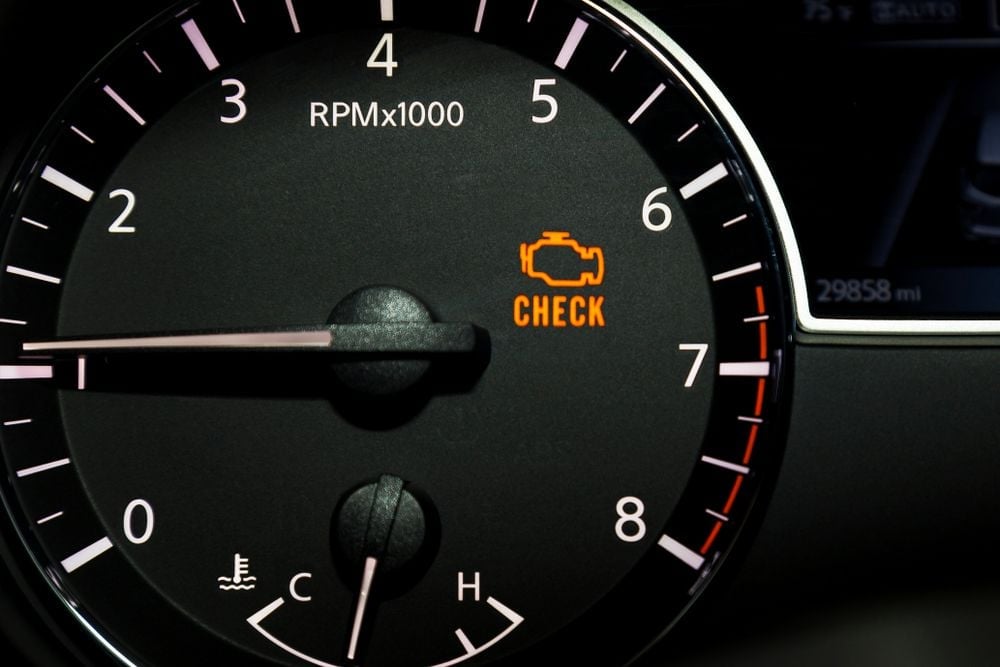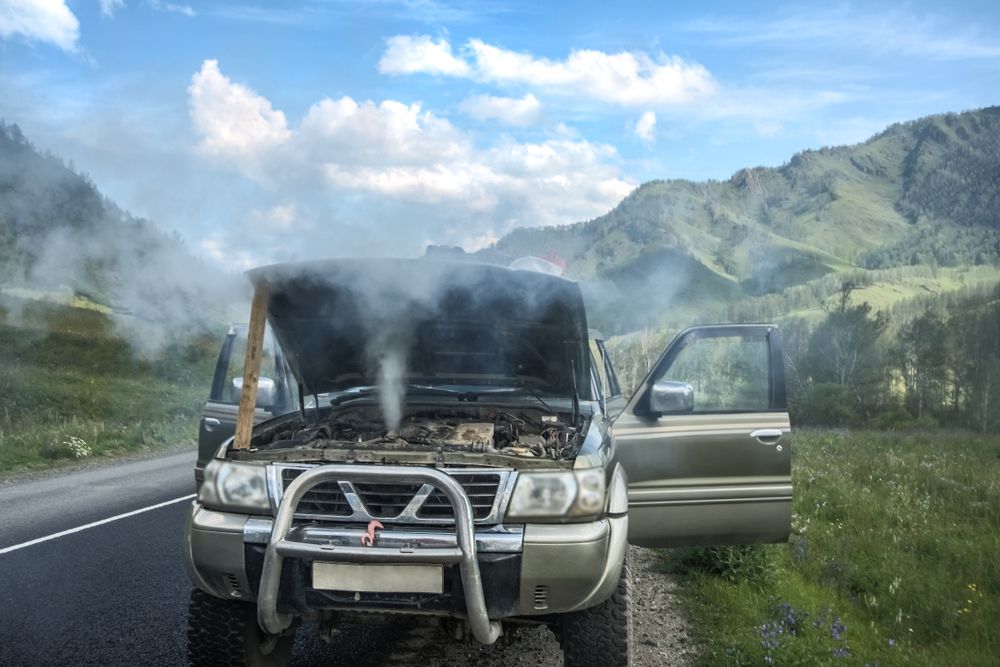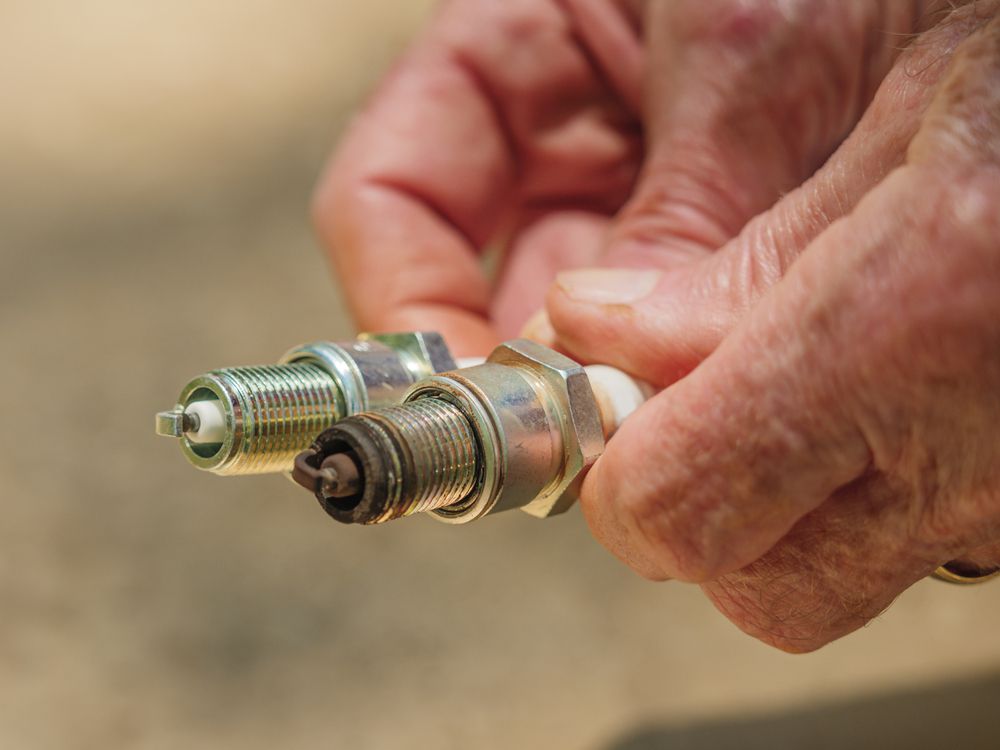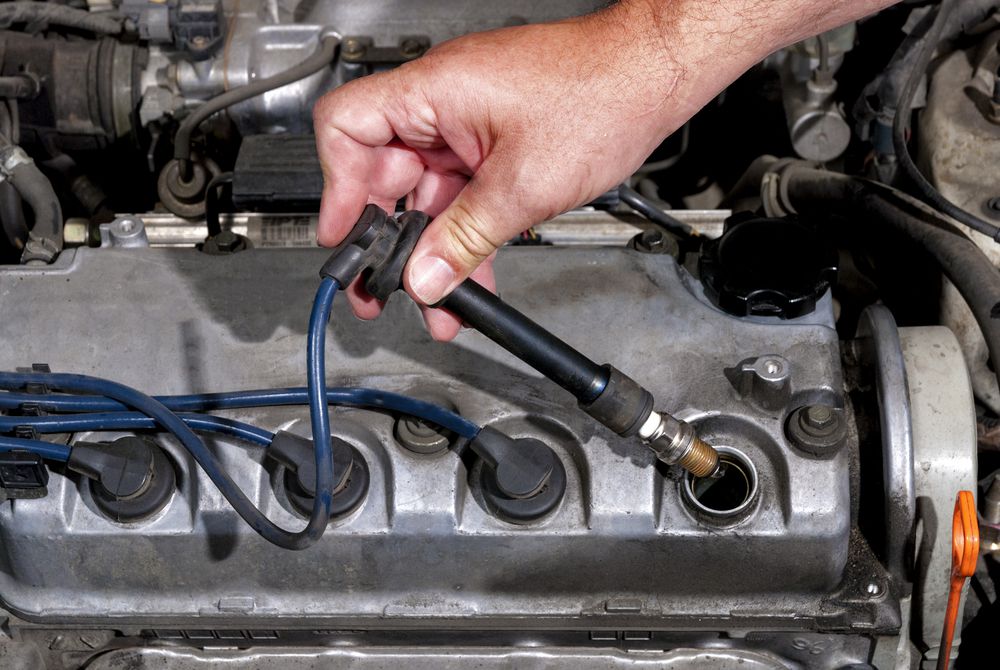
Driving with a blinking check engine light can be very concerning, and you're here asking if you can drive with the
check engine light blinking.
You can drive your car with the check engine light blinking but keep it to a minimum and have an auto shop
troubleshoot the problem as soon as possible.
While a solid engine light could be as minor as a loose gas cap, a blinking check engine could be far more severe and lead to your vehicle leaving you
stranded.
A blinking warning light often indicates engine misfires, unburned fuel in the exhaust system, or other fuel system
problems, and you risk an overheating engine, further car problems, and even irreversible damage to the engine if you
keep driving.
Below, we'll answer common concerns about this engine blinking light, why check engine lights appear, what you can do
about it, and how much it might cost to fix associated problems.
 Check engine light on car dashboard.
Check engine light on car dashboard.
Which is worse flashing check engine light or solid check engine light?
A flashing check engine light is always a bigger cause for concern than a steady check engine light.
A flashing check engine indicates serious damage that is already occurring to the engine and/or exhaust system
(catalytic converter).
On the other hand, a solid check engine light often appears as a warning before serious damage occurs. It's more
often than not indicating that certain parts related to the engine are beginning to malfunction, but that there is
still time to get the issue inspected and fixed before you can no longer drive on it.
Your vehicle manual can tell you more about the specific reasons for a solid check engine light in the dash and
whether it has anything to do with crucial parts like the catalytic converter or not.
More specifically, when the solid check engine light appears, the car's computer will store an error code or trouble
codes that mechanics can read to diagnose the problem. This could be one or more of many different problems,
including:
-
faulty spark plugs (including dried/worn sparkplugs or cracked sparkplugs)
-
malfunctioning mass airflow sensor (or a dirty one)
-
problems with the engine's air-fuel mixture
-
blown head gasket
-
loose gas cap or broken gas cap
-
faulty oxygen sensor or broken oxygen sensor
-
issues with the transmission
-
engine timing issues
What happens if you keep driving with a flashing check engine warning?
If you continue driving your car with the check engine light flashing, you could face serious problems such as an
overheating engine, overheated catalytic converter, and damage to various engine and vehicle systems, such as the
exhaust.
Essentially, you'd be driving with systems that are already malfunctioning, which can cause unnecessary damage to
other car parts and lead to costly repairs.
You also take the risk of breaking down and having to get your car towed, and we all know the costly extra expense of
a tow truck.
And this is not to mention the safety hazard of ending up with a failed catalytic converter, which is quite
dangerous.
Sometimes a vehicle will go into "Reduced Engine Power Mode", in which the vehicles Reduced Engine Power light will also light up and the vehicle will go into limp mode, greatly reducing the vehicles performance. In this case, it's also important to get your vehicle to a mechanic as soon as possible.
 An engine with a check engine light blinking and engine overheating.
An engine with a check engine light blinking and engine overheating.
Why is my check engine light flashing and car shaking?
A flashing check engine light accompanied by a shaking car indicates a very serious problem.
If your vehicle is shaking and the check engine light is flashing it points to a serious engine misfire or a faulty
transmission.
Possible reasons why your check engine light flashing and your car is shaking, include:
Bad Spark Plugs
Bad spark plugs often cause misfires because they aren't able to facilitate engine combustion fast enough or at all.
The result is a lack of necessary engine power and cylinder misfiring.
Bad Ignition Coil
The ignition coil is responsible for generating the voltage required to ignite the air-fuel mixture in the vehicle's
ignition system.
And if the coil isn't working properly, then it won't lead to the proper combustion, a misfire, and a vibrating
engine.
Faulty Engine Sensor
There are two main types of engine sensors that can cause misfire and related shaking - mass airflow and oxygen
sensors.
Since modern vehicles use computers to control the engine, these sensors need to work properly, or else the engine
might receive the wrong information and misfire.
 New spark plug and fouled spark plug.
New spark plug and fouled spark plug.
Bad Plug Wires Or Coil Packs
A bad spark plug wire could be just as detrimental as a faulty spark plug when it comes to combustion.
If you have a check engine light that flashes accompanied by engine shaking, you may have a bad plug.
It might also be due to problems with the related coil packs.
Bad Fuel Injectors
Well-functioning fuel injectors deliver the right amount of fuel in order to keep the fuel-to-air ratio optimized for
a proper combustion process.
Otherwise, the engine could misfire due to combustion issues.
Head Gasket Failure
The head gasket is a critical engine component; if it fails, coolant or air could enter the combustion chamber.
A head gasket leak will quickly lead to overheating and severe damage like warped cylinder heads.
How many miles can you drive with a blinking check engine light?
You shouldn't drive any further than you absolutely have to with a flashing check engine light.
Preferably you should get the vehicle straight to a mechanic to get the check engine trouble codes pulled and
diagnose the problem.
You can also buy your own inexpensive OBD2 scanner and check the trouble codes yourself.
Amazon has a multitude of OBD2 scanners at affordable prices like this one here (paid link).
Can a misfire fix itself?
There are two main types of engine misfires - those that are internal and those that are external.
Internal misfires - those that are internal to the engine and its parts - do not fix themselves.
The only instances in which a misfire can fix itself include times when the issue is external - meaning it comes from a loose gas cap, a damp ignition system that eventually dries off, or bad gas that will be burned away. In this case, after the problem is fixed, the engine control unit will delete its code.
But keep in mind that it's not common for a misfire to go away on its own, and even minor external misfires require
addressing.
 A bad spark plug wire or boot may lead to a misfire and check engine light.
A bad spark plug wire or boot may lead to a misfire and check engine light.
Is a blinking check engine light a misfire?
More often than not, an engine light that flashes indicates a cylinder misfire.
Most vehicles won't display a blinking engine light unless serious issues like misfires are occurring.
When an engine light continues to flash, especially as you accelerate, this is a sign of emission control system
failure leading to misfires.
What are 3 common possible causes of a misfire?
Engine misfiring has a multitude of root causes, so it can be hard to determine the reason merely based on the engine
light and accompanying symptoms.
But the most common reasons that this might occur and result in an engine light blinking include:
-
air-fuel imbalance
-
worn-out ignition parts
-
mechanical issues
1) Air-Fuel Imbalance
The ratio of air to fuel is essential to proper combustion within cylinders.
So when the airflow sensors, oxygen sensors, or even the fuel injectors aren't working, there is imbalance and
misfiring (specifically lean misfiring), resulting in an engine light that flashes.
2) Worn Out Ignition Parts
Spark plugs, plug wires, coils, caps, and other engine parts need to work properly and on time for combustion to
work.
Otherwise, ignition misfiring can occur, also being the reason that the engine light comes on and flashes.
3) Mechanical Issues
Last but not least, consider the possibility of mechanical misfiring being the reason that the engine light comes on
and blinks.
This type of misfire is often due to bad mechanical engine parts like valves,cylinders,
timing belts, gaskets, and injectors.
How much does it cost to fix check engine misfire?
Since engine misfiring is the most likely reason that your engine light comes on in the dash, you should know the
relevant repair costs.
You could be repairing or replacing any number of parts, and more so if you continue to drive on a check engine light
that flashes.
The following cost estimates are based on averages across different locations and vehicle models.
They can fluctuate depending on your circumstances. But the most costly ones are often the exhaust, transmission, and
engine repairs/replacements, which can cost hundreds to thousands of dollars.
Mechanical and Ignition Check Engine Repairs
If the check engine-related misfires are mechanical, then you may need to repair or replace the following parts:
-
sparkplug - average cost of $230 to replace (parts + labor)
-
engine cylinder - average cost of $2,000-$3,000 to replace (parts + labor)
-
head gasket - average cost of $2,000 to replace (parts + labor)
-
fuel injector - average cost of $700 to replace (parts + labor)
-
timing belt - average cost of $600-$700 to replace (parts + labor)
-
ignition coil - average cost of $250 to replace (parts + labor)
-
plug wire - average cost of $200 to replace (parts + labor)
-
valve cover gasket - average cost of $250 to replace (parts + labor)
Major Check Engine Repairs
-
catalytic converter - average cost of $1,900 to replace (parts + labor)
-
engine - average cost of $4,000 to replace (parts + labor)
-
transmission - average cost of $5,000 to replace (parts + labor)
Sensor Check Engine Repairs